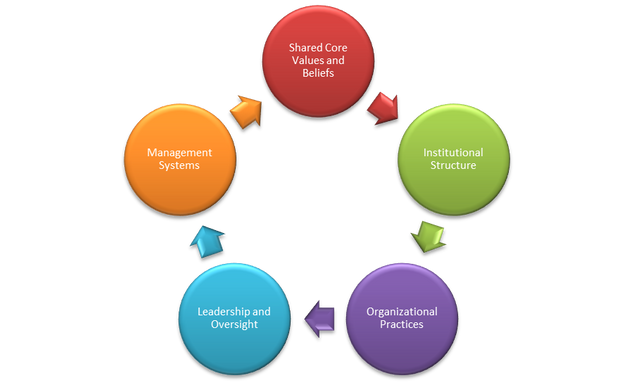Culture of Safety & Responsibility
At Boston University, the health and safety of our students, faculty, staff, patients, and visitors is a top priority.
The following is consistent with the Statement of Commitment to Environmental Health and Safety from the President of Boston University and reflects our dedication to upholding the highest standards across all university settings, including research, clinical, and educational operations. BU promotes a culture of shared responsibility, integrated operational safety, continuous learning, and environmental stewardship. By embedding safety into every aspect of university operations, we strive to support research, education, and clinical operations while protecting the well-being of our community. Learn more about the core principles that shape our approach below:

Personal and Organizational Responsibility
We are committed to fostering a culture where safety is a shared responsibility at all levels of the organization. This includes:
- Leadership and Oversight: Leadership recognition and support of health and safety at every level within the institution.
- Individual Accountability: Each member of the community is empowered to take personal responsibility for their own safety and the safety of those around them.
- Commitment to Standards: We uphold the highest standards of safety and occupational health for all individuals, across all environments and activities.
- Supportive Culture: We foster an environment where open communication is encouraged, allowing safety concerns and errors to be reported without fear of reprisal, thereby promoting continuous learning and improvement.
Integration of Safety into Operations
Safety is an integral part of our core operations. We proactively design and implement systems that ensure safe practices in all aspects of our work, including:
- Operational Integration: Embedding safety considerations into research, education, and clinical activities, facility design, equipment usage, and day-to-day operations.
- Collaborative Efforts: Promoting collaboration among faculty, staff, students, EHS staff, facilities personnel, clinical providers, and other stakeholders to identify and address safety issues early and effectively.
- EHS Management Systems: These plans outline the proactive programs developed by EHS that help create a safe and healthy environment for the BU community. These systems are described on the EHS website in the “Programs & Services” dropdown menus for each of the EHS divisions. Safety plans specific to the National Emerging Infectious Diseases Laboratories (NEIDL) are on the NEIDL website.
Education, Communication, and Continuous Improvement
Ongoing education and responsive communication are key to maintaining a safe and informed community. Organizational learning is not only expected but is also embraced and encouraged. We focus on:
- Targeted Training: Providing comprehensive safety education to equip individuals with the knowledge and tools to reduce risk.
- Incident Response and Learning: Investigating all incidents thoroughly, sharing lessons learned, and updating policies and procedures to prevent recurrence.

Environmental Health and Sustainability
We are committed to minimizing our environmental impact through responsible practices that support both health and sustainability, including:
- Pollution and Waste Reduction: Monitoring and Eliminating or reducing air and water pollution and minimizing the generation of waste across all activities.
- Transparent Communication: Offering timely and transparent responses to environmental health and safety inquiries, fostering trust and accountability.
By upholding the principles outlined above, we ensure that Boston University remains a place where innovation thrives, learning is supported, clinical services are delivered safely and ethically, and every individual is protected. Together, we can cultivate a culture of safety that embodies our values and supports the University’s mission.
Training
Boston University recognizes the importance of safety training as a critical element of a comprehensive safety program designed to prevent work-related accidents, injuries, exposures, and near misses. Faculty, students, staff, and visitors are provided with training as appropriate in safe work practices. Supervisors are provided with EHS support in ensuring their staff are compliant with required training programs. Training and education modules are developed to motivate trainees to anticipate all types of adverse events, eradicate them when possible, and mitigate their effects if they cannot be prevented.
In accordance with regulatory requirements and policies at BU faculty, students, staff, and visitors may be required to complete a variety of training modules that address hazardous materials or safe practices in the workplace. These requirements are mandatory for all individuals who work with hazardous materials, including biological, chemical, and radiological, as well as for those individuals who conduct physically hazardous procedures.
The goal of BU’s safety training programs is to ensure all individuals receive the necessary instruction through online modules, classroom sessions, and hands-on experience to perform their work safely, responsibly, and in accordance with all regulations and standards. In addition to the types of training listed above, training also includes review of standard operating procedures (SOPs) and participation in drills and exercise programs Key features of the program include:
A list of EHS training programs is shown on the Office of Research website. Examples include:
- General lab safety training
- Fire Safety training
- Hazard Communication Training.
- BMC Safety Training
- Basic Radiation Safety training
- Asbestos Awareness Training
- Lock Out Tag Out training (LOTO)
- NEIDL Orientation Training
- Animal Facility Access Training
Reporting Concerns
BU culture of safety encourages an open environment where individuals are empowered to recognize and report errors or near misses without fear of reprimand or punishment. If you have any questions or concerns, you should discuss them with your supervisor, PI, or EHS representative.
Reporting Errors or Near Misses
Treatment and Accident Reporting